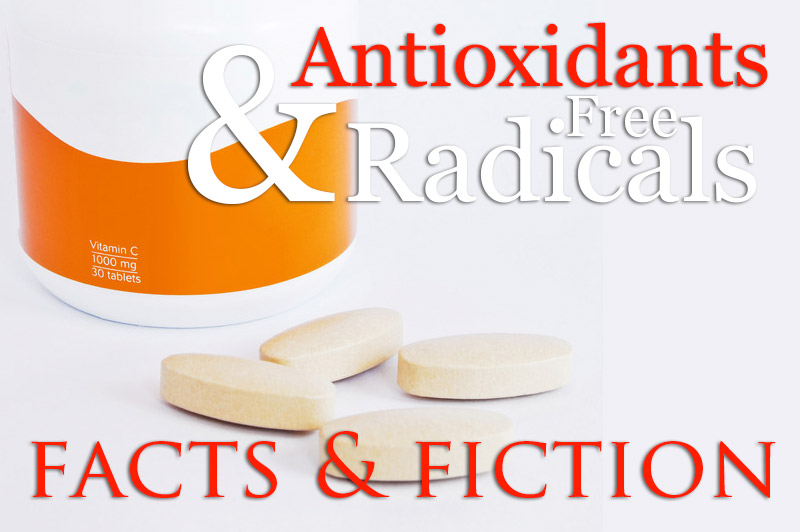Antioxidants And Free Radicals: Fact And Fiction
Miraculous Benefits of Moderate Antioxidant Intake: Harmon's Story
Denham Harmon is an extraordinary researcher. Like most of the great scientists what he writes is easy to understand, even to a non-technical person. He writes about free radicals very much as a philosopher might explore life and death - yet at a molecular level. Harmon's work makes clear that free radical reactions are indeed essential to life. So much is this the case that it is likely to be redox reactions that produced life on earth and which largely engineered evolution through their effect on DNA.
Harmon is also quite clear that for high level health and the prevention of premature aging most of us need to use antioxidants in some form from the age of 27 onwards. And does he take antioxidants himself? You bet he does. Yet not in excess as some anti-aging enthusiasts urge us to do. He takes them in moderate doses - 400 iu vitamin E and 2 grams vitamin C, 30mg coenzyme Q-10, plus 25,000 iu beta carotene every other day. He would take more, he says, but he can't afford to be fatigued.
forget magic bullets
What does this mean when just about every book and article on aging these days urges us to take more and more? It means that in all our enthusiasm to get on the free radical band wagon many of us have fallen into the same trap of mechanistic thinking that limits much of orthodox medicine. In an attempt to slow aging we tend to treat antioxidants as "magic bullets" losing all awareness of the importance of interrelationships between them and synergy in the body. More and more antioxidants does not necessarily mean better and better.
Taking too many antioxidant supplements can eventually leave you chronically tired with weak muscles. Harmon and his colleagues have discovered through animal experiments that very large quantities of antioxidants such as BHT - a synthetic commonly used as a food preservative - will actually suppresses the proper functioning of the mitochondria (the little energy factories in the cells), as well as the production of ATP (the body's own energy currency). There is no question that we need antioxidants, yet there is no simple answer as to exactly how much of vitamin E, selenium, vitamin C, and the carotenoids, we optimally take.
go for balance
20 years ago I became aware of the importance of taking antioxidants to protect the body as a result of my having interviewed some of the top anti-aging experts in the world. Later, when I was writing Ageless Aging, I put into practice what they taught me. To put it simply: that the more antioxidants you take the healthier and the better protected from premature aging you would be.
Yet as the years passed, certain things began to bother me. I wanted to know, for instance, how much of the various antioxidants are enough? And can you take too many? I couldn't understand how free radicals could be so bad since they were also necessary for life. Finally I was curious about my own body's reaction to taking high doses of antioxidants - 1600 iu vitamin E and 150,000 iu of mixed carotinoids, and 10 grams of vitamin C a day. Doing all this, I figured, should have had me feeling full of energy. Yet as the years passed I found myself more and more fatigued despite being perfectly well. None of it made sense.
I figured if you want the straight story you had better get it from the horse's mouth. So I went back to the work done by Denham Harmon, MD, PhD, the man who conceived the free radical theory of aging in the first place, way back in 1954 and one of the most celebrated experts on aging in the world.
I had been taking too many antioxidant supplements. Don't get me wrong. These free radical scavengers did work. I looked around me to find that my skin was not falling apart as was that of many friends of the same age, yet I still had this problem with energy. After learning what I should have known all along I cut down my intake of antioxidant nutrients only to find that within a couple of weeks my energy increased dramatically.
Recently The Alliance for Aging Research, a nonprofit organization based in Washington DC recommended that people who are generally healthy need somewhere between 100-400 iu of vitamin E, 17,500-50,000 iu beta-carotene, and 200-1000 mg of vitamin C a day. Exactly how much is right for you depends on a lot of things: Do you smoke? Do you live at high altitudes? Do you drink more than a glass of alcohol a day? Do you eat convenience foods rich in junk fats? Do you eat sugar? Doing any of these things increases your need for antioxidants. Eating a high raw diet of fresh unprocessed foods dramatically decreases it.
